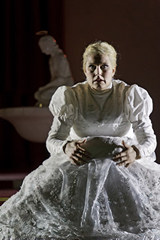| Opera Reviews | 25 April 2024 |
The singers, conductor and musicians do Rusalka proudby Colin Anderson |
|
| Dvorak: Rusalka The Royal Opera 1 March 2012 |
|
|
First seen at the Salzburg Festival in 2008, this urban staging directed by Jossi Wieler and Sergio Morabito, here revived by Samantha Seymour, lacks illumination and interest and is mostly dull. Those who booed on the opening night must then have been bored. Maybe those with very acute sensibilities took exception to the main setting, which suggests a brothel - red lights and all - so maybe Vodnik (Rusalka's father) is pimping his other daughters. It doesn't really matter, for the staging seems indifferent to the story and one's reaction to what is seen is equally ambivalent. We are supposed to be in a forest, or near water, or at a lavish wedding ceremony, but none of these things come through much in an unvaried production that ignores such scenic contrasts; the stage revolves for another view of the same objects and the trapdoor (from which Rusalka escapes from the sea before a note of music is heard and through which the dead prince is unceremoniously dumped come the denouement) is cumbersome to handle and unreasonably noisy in the process. Back projection offers some variety, but trying to work out what a particular image is only offers further distraction. Forget that then and enjoy the music, which is wonderful, and the performances, which are magnificent. Poor old Rusalka wants to be human and get close to the prince. She cannot speak in human form and, anyway, he is also attracted to the Foreign Princess, which devastates the innocent Rusalka. Vodnik (scaly and reptilian as back-projected) protects the laws of the sea and doesn't want to lose Rusalka. He can be tender as well as domineering. It's a sad and tragic story. Yannick Nézet-Séguin (house debut) paces the work perfectly, has its beauty and exhilaration in place, and obtains some terrific playing from the orchestra, not least from the sensitive and expressive woodwind players. Camilla Nylund, having appeared in the Salzburg production and now making her Royal Opera debut, is a committed Rusalka, giving a really open-voiced account full of emotion and character. She brings genuine poignancy to 'Song to the moon,' that gloriously rapturous Act I aria (but Rusalka contains much that is terrific beyond this hit). On this night, she was very enthusiastic chucking her shoes around; one entered the pit and struck a violinist! Alan Held is superb as Vodnik, his resonant baritone ideally authoritative as a pestering if caring parent, and Bryan Hymel is an ardent heroic tenor as the Prince, unstinting in Act III. Petra Lang was imperious as the Princess, and has a nicely vitriolic way with shutting the lid of a piano! The cast is uniformly stellar, but so much of the work is blandly staged. But don't miss the chance to hear a great opera, for the singers, musicians and Nézet-Séguin (as alive to Slavonic dance as he is to deep utterance) do it proud. |
|
| Text ©
Colin Anderson Photo © Clive Barda |

 There
were boos on the first night for the creative team. It made the news.
Good publicity! Something and nothing really for there was no disenchantment
on behalf of the audience on this the subsequent performance (but no
team to boo, either). That said the production is uninteresting for
this first staging of Rusalka by The Royal Opera (although not
its first appearance within the House's hallowed walls - there were
two concert performances in July 2003 with Renée Fleming as the water-nymph
and Sir Charles Mackerras conducting).
There
were boos on the first night for the creative team. It made the news.
Good publicity! Something and nothing really for there was no disenchantment
on behalf of the audience on this the subsequent performance (but no
team to boo, either). That said the production is uninteresting for
this first staging of Rusalka by The Royal Opera (although not
its first appearance within the House's hallowed walls - there were
two concert performances in July 2003 with Renée Fleming as the water-nymph
and Sir Charles Mackerras conducting). 





